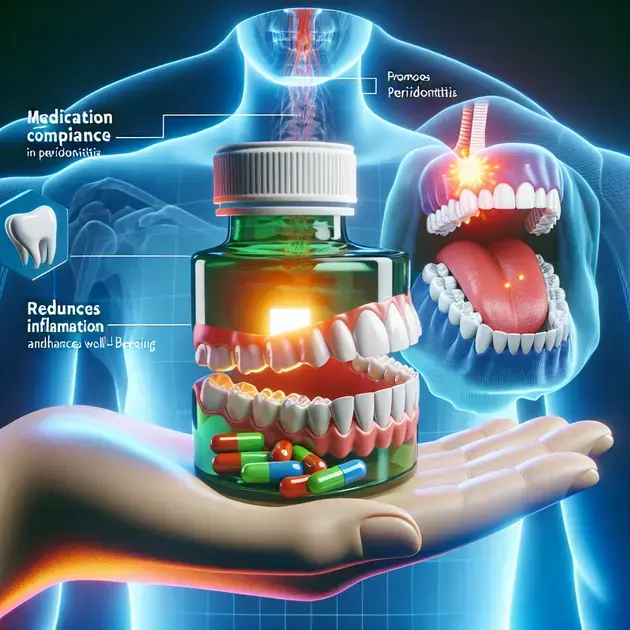Are you struggling with periodontitis and looking for effective medication options? You’re in the right place! This comprehensive guide will provide you with all the information you need to effectively manage and treat periodontitis.
Periodontitis is a serious gum infection that damages the soft tissue and destroys the bone supporting your teeth. With the right medication and care plan, you can effectively combat periodontitis and improve your oral health. Let’s dive into the various medication options available and how they can help you regain control over your dental health.

Understanding Periodontitis Medication Options
When it comes to understanding periodontitis medication options, it’s essential to consult with your dentist or periodontist to determine the best course of treatment for your specific condition. One common medication option for periodontitis is antibiotics, which can help combat bacterial infections in the gums. Your healthcare provider may prescribe antibiotics such as doxycycline or minocycline to reduce inflammation and promote healing.
In addition to antibiotics, another medication option for periodontitis is antimicrobial mouth rinses. These rinses contain agents that can help reduce bacteria in the mouth and prevent infection. Your dentist may recommend a specific antimicrobial mouth rinse to use as part of your daily oral hygiene routine.
It’s also important to note that in some cases, your dentist may recommend non-surgical treatments such as scaling and root planing before or in conjunction with medication. This deep cleaning procedure can help remove plaque and tartar buildup from the teeth and roots, allowing for better penetration of medication and improved healing.
Understanding the various medication options available for periodontitis is crucial in effectively managing and treating this condition. By working closely with your healthcare provider and following their recommendations, you can improve your oral health and prevent further complications.
The Importance of Effective Medication in Treating Periodontitis
Effective medication plays a crucial role in treating periodontitis and preventing its progression. Without proper medication, periodontitis can lead to serious oral health issues, including tooth loss and bone deterioration. This is why it’s essential to follow your dentist’s prescribed treatment plan and take any medications as directed.
One key benefit of effective medication in treating periodontitis is its ability to target and eliminate bacteria that cause gum disease. Antibiotics and antimicrobial agents can help reduce inflammation, promote healing, and prevent the spread of infection in the gums.
Consistency is key when it comes to medication for periodontitis. Make sure to take your prescribed medications on time and as directed to ensure they are effective. Additionally, be sure to attend all follow-up appointments with your dentist to monitor your progress and make any necessary adjustments to your treatment plan.
By understanding the importance of effective medication in treating periodontitis, you can take control of your oral health and work towards a healthier, happier smile. Remember, your dentist is there to support you every step of the way and help you achieve optimal treatment outcomes.
Choosing the Right Medication for Your Periodontitis Treatment
When it comes to choosing the right medication for your periodontitis treatment, it’s important to consider your specific condition and any underlying health issues you may have. Your dentist or periodontist will take into account factors such as the severity of your gum disease, your medical history, and any allergies you may have when recommending medication options.
In some cases, your dentist may recommend a combination of medications to effectively treat periodontitis. This could include antibiotics, antimicrobial mouth rinses, and topical gels or creams to target bacteria and reduce inflammation in the gums.
Before starting any medication for periodontitis, make sure to discuss any concerns or questions you have with your healthcare provider. They can provide you with detailed information about the medications, including how to take them, potential side effects, and what to expect during treatment.
It’s crucial to follow your dentist’s recommendations when choosing and using medication for periodontitis. By taking an active role in your treatment plan and working closely with your healthcare team, you can improve your oral health and prevent the progression of gum disease.

**The Role of Medication Compliance in Periodontitis Treatment**
Understanding the Importance of Medication Compliance
Medication compliance plays a vital role in the successful treatment of periodontitis. By following the prescribed medication regimen consistently, patients can effectively manage the symptoms of this chronic inflammatory disease. Failure to comply with medications can lead to exacerbation of periodontal issues, including gum inflammation, deep pockets, and potential tooth loss.
Effective medication compliance empowers individuals to take control of their oral health and work towards long-term periodontitis management. It is essential for patients to understand the purpose of each prescribed medication, the correct dosage, and the frequency of administration to achieve optimal results.
Furthermore, maintaining medication compliance can contribute to reducing the need for invasive dental procedures and promote overall dental well-being. Patients who adhere to their medication schedules are more likely to experience improvements in gum health, reduced inflammation, and enhanced oral hygiene.
By fostering a commitment to medication compliance, individuals can actively participate in their periodontitis treatment journey and pave the way for a healthier smile. Taking prescribed medications as directed by dental professionals is a proactive step towards combating the progression of this prevalent oral condition.
Embracing the Benefits of Medication Adherence
Consistent medication adherence is key to unlocking the full potential of advanced medication therapies for oral health enhancement. Patients who diligently follow their prescribed medication regimens increase the likelihood of experiencing positive outcomes in periodontitis treatment.
Adhering to medications as part of a comprehensive oral care plan can lead to a reduction in inflammation, improved gum health, and enhanced overall oral hygiene. By prioritizing medication adherence, individuals can actively contribute to the success of their periodontal treatment and maintain strong teeth and gums.
Furthermore, embracing the benefits of medication adherence can help prevent the escalation of periodontal issues and minimize the risk of complications associated with untreated gum disease. By demonstrating commitment to medication adherence, patients can foster a proactive approach to oral health management and enjoy the rewards of a healthier smile.
Through consistent medication adherence, individuals can optimize the effectiveness of advanced medication therapies and pave the way for sustained periodontitis treatment success. By staying dedicated to their prescribed medication schedules, patients can take charge of their oral health and work towards a brighter dental future.
**
Conclusion
**
Medication compliance is pivotal in effectively managing periodontitis, a chronic inflammatory disease impacting oral health. Through dedicated adherence to prescribed medication regimens, patients can mitigate symptoms and prevent potential complications such as gum inflammation and tooth loss. Understanding the purpose, dosage, and frequency of medications is essential for optimal treatment outcomes.
By maintaining medication compliance, individuals empower themselves to take control of their oral health, fostering long-term management of periodontitis. This adherence not only reduces the necessity for invasive dental procedures but also enhances overall dental well-being by improving gum health, reducing inflammation, and promoting superior oral hygiene practices.
Embracing the benefits of medication adherence is key to successful periodontitis treatment, as it can lead to a reduction in inflammation, improved gum health, and minimized risks associated with untreated gum disease. By prioritizing adherence, patients actively contribute to the success of their treatment, nurturing strong teeth and gums and preventing the escalation of periodontal issues.
Consistent medication adherence optimizes the effectiveness of advanced medication therapies, paving the way for sustained periodontitis treatment success. Through unwavering dedication to prescribed medication schedules, individuals not only proactively manage their oral health but also strive towards a future with a brighter smile and healthier dental outcomes.



